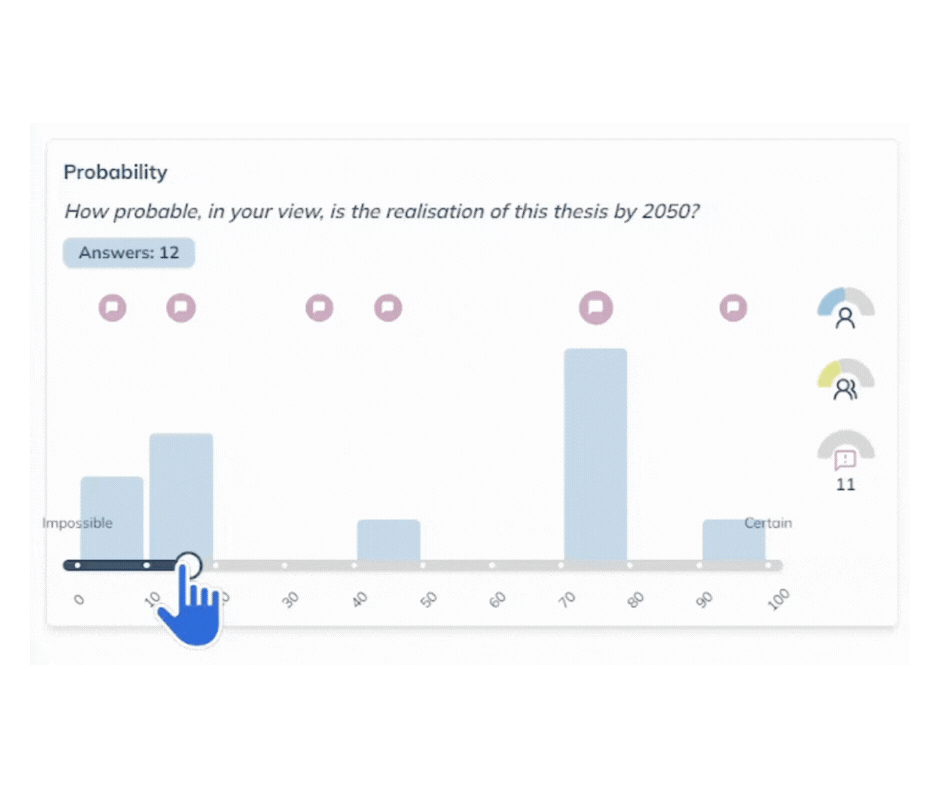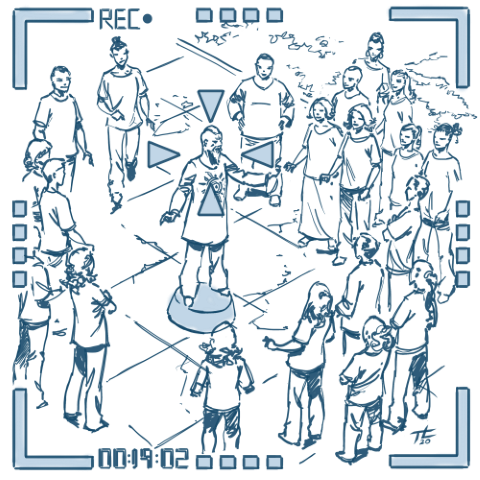Delphi in healthcare
From core outcomes to clinical guidelines


Navigating complexity and responsibility in healthcare decisions
Healthcare operates at a complex intersection of evolving science, clinical judgment, economic realities, ethical considerations, and deeply personal patient experiences. Making sound decisions within this sphere – whether setting standards for clinical trials, developing treatment guidelines, defining quality care, or prioritizing research – requires navigating immense complexity and achieving meaningful agreement among diverse stakeholders.
Crucially, because these decisions directly impact lives and well-being, the process carries a profound ethical responsibility. In this high-stakes environment, the Delphi method provides an invaluable framework. It offers a structured, systematic approach to gather diverse expertise and facilitate informed consensus, moving beyond unstructured opinion towards robust, transparent, and ethically considered outcomes grounded in collective insight.

Why Delphi is essential in the healthcare context
Delphi’s core principles are particularly potent for addressing healthcare’s unique challenges and responsibilities:
![]() Integrating diverse stakeholder input: Meaningful healthcare decisions require input not just from clinicians and researchers, but critically from patients, caregivers, policymakers, and others. Delphi’s anonymity empowers all voices, reducing the influence of hierarchy or professional status and allowing perspectives (like patient experience) to be evaluated on merit.
Integrating diverse stakeholder input: Meaningful healthcare decisions require input not just from clinicians and researchers, but critically from patients, caregivers, policymakers, and others. Delphi’s anonymity empowers all voices, reducing the influence of hierarchy or professional status and allowing perspectives (like patient experience) to be evaluated on merit.
![]() Synthesizing complex evidence and lived experience: The method provides a structured way to integrate formal research findings with invaluable clinical experience and patient-reported insights – essential when evidence is uncertain, conflicting, or needs translation into real-world practice.
Synthesizing complex evidence and lived experience: The method provides a structured way to integrate formal research findings with invaluable clinical experience and patient-reported insights – essential when evidence is uncertain, conflicting, or needs translation into real-world practice.
![]() Facilitating reasoned, ethical deliberation: Delphi’s iterative nature and core focus on sharing justifications create a space for thoughtful consideration of sensitive topics and ethical trade-offs. This structured dialogue supports a more accountable and transparent process for reaching difficult, value-laden conclusions than informal methods allow.
Facilitating reasoned, ethical deliberation: Delphi’s iterative nature and core focus on sharing justifications create a space for thoughtful consideration of sensitive topics and ethical trade-offs. This structured dialogue supports a more accountable and transparent process for reaching difficult, value-laden conclusions than informal methods allow.
![]() Driving necessary standardization: Developing widely accepted standards like Core Outcome Sets or clinical guidelines requires rigorous consensus-building to ensure relevance, buy-in, and legitimacy across the field.
Driving necessary standardization: Developing widely accepted standards like Core Outcome Sets or clinical guidelines requires rigorous consensus-building to ensure relevance, buy-in, and legitimacy across the field.

Key Delphi applications in healthcare
Delphi’s structured approach is applied across many critical healthcare tasks:
![]() Developing and updating Core Outcome Sets (COS): Delphi is a commonly used method for deciding the core outcomes to measure in all trials for a specific condition. It brings patients, clinicians, and researchers together to prioritize outcomes that reflect what truly matters across stakeholder groups.
Developing and updating Core Outcome Sets (COS): Delphi is a commonly used method for deciding the core outcomes to measure in all trials for a specific condition. It brings patients, clinicians, and researchers together to prioritize outcomes that reflect what truly matters across stakeholder groups.
![]() Establishing clinical practice guidelines and protocols: It helps expert panels reach consensus on best practices, particularly valuable when high-quality trial evidence is limited, or clinical judgment is needed to interpret existing evidence (aligning with the RAND/UCLA Appropriateness Method concept).
Establishing clinical practice guidelines and protocols: It helps expert panels reach consensus on best practices, particularly valuable when high-quality trial evidence is limited, or clinical judgment is needed to interpret existing evidence (aligning with the RAND/UCLA Appropriateness Method concept).
![]() Defining healthcare quality and performance indicators: Delphi facilitates agreement among diverse groups (patients, providers, managers) on meaningful, measurable indicators that capture quality care accurately and ensure accountability aligns with patient and clinical priorities.
Defining healthcare quality and performance indicators: Delphi facilitates agreement among diverse groups (patients, providers, managers) on meaningful, measurable indicators that capture quality care accurately and ensure accountability aligns with patient and clinical priorities.
![]() Setting health research and public health priorities: It offers a transparent way to involve a wide range of stakeholders in collaboratively identifying the most critical research questions or public health interventions, guiding resource allocation responsibly.
Setting health research and public health priorities: It offers a transparent way to involve a wide range of stakeholders in collaboratively identifying the most critical research questions or public health interventions, guiding resource allocation responsibly.

The case for Real-Time Delphi (RTD) in modern healthcare
While traditional Multi-Round Delphi (MRD) has been historically prevalent in healthcare, its lengthy process, inherently low dynamics and limited interaction present challenges. Evidence (see e.g. https://pmc.ncbi.nlm.nih.gov/articles/PMC10354951/) and experience increasingly favour Real-Time Delphi (RTD) for many reasons:
![]() Efficiency: Research comparing MRD and RTD for COS development demonstrated RTD’s superior efficiency, completing studies significantly faster. This speed is vital for timely guideline updates or efficient review of numerous existing COSs in rapidly evolving fields.
Efficiency: Research comparing MRD and RTD for COS development demonstrated RTD’s superior efficiency, completing studies significantly faster. This speed is vital for timely guideline updates or efficient review of numerous existing COSs in rapidly evolving fields.
![]() Participant engagement: RTD may lead to higher completion rates, likely due to reduced participant burden and more dynamic engagement compared to the long waits and potential fatigue associated with MRD.
Participant engagement: RTD may lead to higher completion rates, likely due to reduced participant burden and more dynamic engagement compared to the long waits and potential fatigue associated with MRD.
![]() Robust Outcomes: RTD achieves comparable or even potentially greater convergence on ratings without forcing participation in multiple distinct rounds, suggesting its dynamic feedback loop is highly effective.
Robust Outcomes: RTD achieves comparable or even potentially greater convergence on ratings without forcing participation in multiple distinct rounds, suggesting its dynamic feedback loop is highly effective.
RTD’s blend of efficiency and dynamic interaction makes it a compelling choice for rigorous yet practical consensus-building in contemporary healthcare.

Beyond basic platforms: Ensuring meaningful and responsible dialogue
Given the profound impact of healthcare decisions, the quality and depth of the Delphi process are paramount. Simply achieving rapid agreement on numbers using basic RTD tools is insufficient and fails to meet the responsibility inherent in this work. It’s essential that the chosen platform actively facilitates deep understanding, critical reflection, and the integration of diverse values:
![]() Prioritizing reasoning over scores: Understanding the ‘why’ behind expert ratings or patient priorities is fundamental for trustworthy and implementable outcomes. Next-generation platforms (like 4CF Halnyx 2.0) are designed to make exploring qualitative justifications intuitive and central, allowing for genuine engagement with the substance of the arguments.
Prioritizing reasoning over scores: Understanding the ‘why’ behind expert ratings or patient priorities is fundamental for trustworthy and implementable outcomes. Next-generation platforms (like 4CF Halnyx 2.0) are designed to make exploring qualitative justifications intuitive and central, allowing for genuine engagement with the substance of the arguments.
![]() Ensuring all voices contribute to understanding: Effective platforms must make it easy to see and consider all perspectives – especially crucial patient input or dissenting clinical opinions (outliers) – preventing dominant views from inadvertently silencing critical insights. Facilitating truly inclusive dialogue is key to responsible consensus.
Ensuring all voices contribute to understanding: Effective platforms must make it easy to see and consider all perspectives – especially crucial patient input or dissenting clinical opinions (outliers) – preventing dominant views from inadvertently silencing critical insights. Facilitating truly inclusive dialogue is key to responsible consensus.
![]() Supporting nuanced deliberation: Healthcare issues often involve complex ethical trade-offs or subtle interpretations. Platforms need features that support structured interaction, allowing participants to probe assumptions, discuss nuances, and collectively build understanding beyond simple rating scales.
Supporting nuanced deliberation: Healthcare issues often involve complex ethical trade-offs or subtle interpretations. Platforms need features that support structured interaction, allowing participants to probe assumptions, discuss nuances, and collectively build understanding beyond simple rating scales.
Choosing a platform like 4CF Halnyx 2.0 architected for deep understanding, transparent reasoning exploration, and robust interaction, is crucial for enabling the responsible, ethically sound, and genuinely insightful consensus processes needed in healthcare today.

Delphi as a cornerstone for responsible healthcare consensus
In the complex, high-stakes world of healthcare, achieving informed consensus among diverse stakeholders is often essential for improving outcomes, ensuring equity, and guiding ethical practice. The Delphi method provides a robust framework for structuring this critical dialogue. Its evolution into Real-Time Delphi, particularly when powered by next-generation platforms like 4CF Halnyx 2.0 designed for deep dialogue and understanding diverse perspectives, offers the most effective and efficient means available today to build the meaningful, responsible consensus needed. Investing in rigorous methodology and appropriate tools that prioritize deep understanding over superficial agreement is fundamental to navigating healthcare complexity wisely and ethically.

Experience the next generation of Delphi
4CF Halnyx 2.0 provides the intuitive, powerful, and insight-focused platform needed to conduct effective Real-Time Delphi studies that deliver meaningful results.
Interested in Delphi and RTD? Explore our expert series:
4CF Delphi Expert Series offers comprehensive insights, drawing on extensive experience, covering everything from the fundamentals to advanced applications and the crucial role of next-generation platforms. Whether you're new to Delphi or an experienced practitioner, explore these articles to deepen your knowledge and enhance your results.






Explored these? Discover even more in our full Delphi series
Interested in Delphi and RTD? Explore our expert series:
4CF Delphi Expert Series offers comprehensive insights, drawing on extensive experience, covering everything from the fundamentals to advanced applications and the crucial role of next-generation platforms. Whether you're new to Delphi or an experienced practitioner, explore these articles to deepen your knowledge and enhance your results.
Explored these? Discover even more in our full Delphi series
Stay updated! Subscribe to our newsletter:
By subscribing to our newsletter, you consent to the processing of the provided data. The data controller is 4CF Sp. z o.o., its registered office is located in Warsaw, 10/14 Trzech Krzyży Square, postal code: 00-499.
We process your data solely for the purpose of sending information about 4CF Sp. z o.o. and its activities via e-mail. Your data will be processed until your consent is revoked through a link that will be included in each newsletter. The withdrawal of consent shall not affect the lawfulness of processing based on consent before its withdrawal. Providing your data is voluntary, but necessary if you wish to receive information about 4CF Sp. z o.o. and its activities. We may transfer the data to our suppliers of services related to the processing of personal data, e.g. IT service providers. Such entities process data on the basis of a contract with our company and only in accordance with our instructions. You have the right to request access to your personal data, its rectification, deletion or limitation of processing, as well as the right to lodge a complaint with the supervisory authority. More information about your rights and about the processing of your personal data can be found in our privacy policy.






